Originally a script for a video review, so some parts may stick out and, without visual aids, I recommend having played the game already! Note: this is for the original Tales of Symphonia, so if anything changed in the re-release, I haven’t touched on it here.
Quick links to other entries:
Intro
Part 2
Part 3
Part 4
Part 5
—
—
—
The story in Tales of Symphonia, especially early on, aims toward old-school RPG fans. People who value originality above all may not like it too much, but some of us live for this kind of thing. For the most part, it’s a fun and lighthearted fantasy story–and like with so much classical fantasy (see the Silver Age of comics, Dragonball Z), the story is a little silly (see Batman: The Brave and the Bold, original Dragonball), a little cheesy (Star Wars, Sailor Moon), and even a little self-contradicting, but that’s the beauty of it and it has a big heart in the right place.
If you want to jump on the emotional roller coaster, though, you’ll need to play the game yourself. I’m only here to make fun of what I love. To get 100% completion, you need to finish this game at least three times—and I did that and started noticing certain… things. I’ll take them in the order they come up.
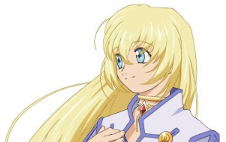


the three mandatory best friends for 100% completion
—
—
—
1) Colette Brunel Who Now?

It seems like the writers had no idea what to do with Colette’s character. I’m not saying I don’t like her! I like her a lot, but we’ll talk about that later. I’m just saying it seems they wanted to make their heroine appeal to everybody, so they gave her every character trait they could think of even when they conflict with each other. You can tell in the first few minutes if you look for it. Let’s go to examples!
We start with a primer on why the world sucks and how to fix it. The Hero Mithos sealed away Desians a few millennia ago; they’re back oppressing the people; mana is dying; the Chosen has to journey and awaken the Summon Spirits. But who explains all this? ![]() Raine,
Raine, ![]() Genis, and…
Genis, and… ![]() Colette. What have we learned from this?
Colette. What have we learned from this?
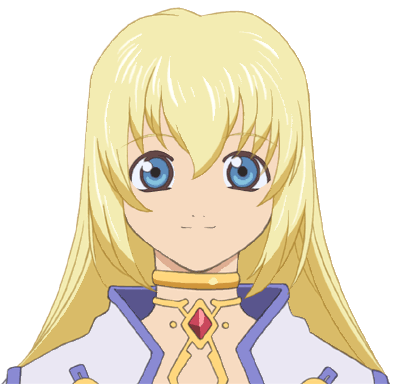 Colette takes being the Chosen One seriously and knows all the details of her journey to save the world.
Colette takes being the Chosen One seriously and knows all the details of her journey to save the world.
Then there’s a flash of light outside. Raine believes it’s the Oracle who approves the Chosen, tells everyone to wait there, and heads out.
![]() Lloyd isn’t having it, but as for Colette…
Lloyd isn’t having it, but as for Colette…
Hmm… Are you curious about it?
Of course!
Okay, then I’ll be curious about it, too.
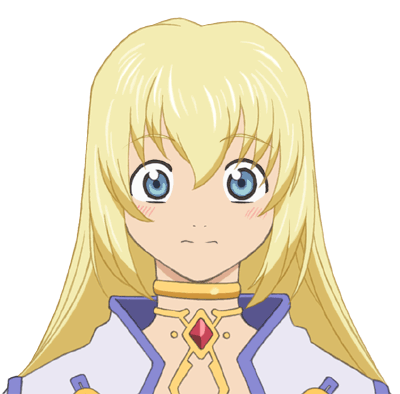 She cares about being the Chosen One passively if at all.
She cares about being the Chosen One passively if at all.
Right outside, her father tells her Desians have attacked the temple, then she cuts him off mid-sentence and promises to fulfill her duty.
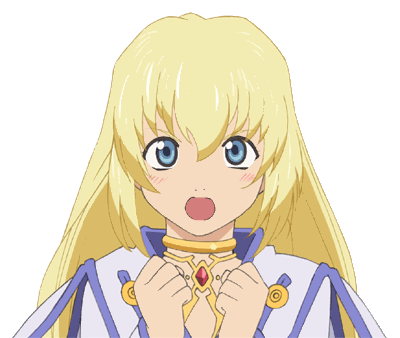 Even before others can remind her of her responsibilities, Colette knows what they are and vows to live up to them.
Even before others can remind her of her responsibilities, Colette knows what they are and vows to live up to them.
So off they go. A light shines up from the temple and leaves Genis starstruck over Colette being the Chosen soon, but here’s her line: “It’s really, really, bright!” Lloyd wants her to act more Chosen-like, because apparently he thinks he can dictate her personality, and she’s like: “Yeah! No problem. No problem.”
 She has her head in the clouds.
She has her head in the clouds.
Then a wounded pastor limps over and dies in front of them. The group grieves, but finally Colette starts forward despite the danger, telling her friends to stay behind.
Yes… but I have to go. I’m the Chosen. My job is to accept the oracle on the Day of Prophecy. The two of you, wait here, okay?
Not that they’ll listen, but…
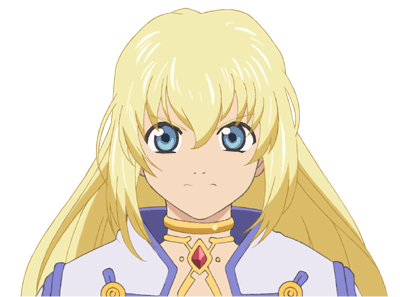 For the sake of becoming the Chosen One, Colette will face certain death on her own.
For the sake of becoming the Chosen One, Colette will face certain death on her own.
Do you see it? All this happens in five minutes and she’s flipped her personality four times.
I understand that she falls into two categories not known for their stellar and perfect consistency: sixteen-year-old girls and humans in general. But when real people are inconsistent, it’s usually because they’re acting from self-interest. Fictional characters act in the interest of the story, communicating information to the audience and making them think or feel a certain way. Countless authors have sayings about that.
“Truth is always strange, stranger than fiction.” -Lord Byron
“Truth, of course, must of necessity be stranger than fiction; for we have made fiction to suit ourselves.” -G.K. Chesterton
“It’s no wonder that truth is stranger than fiction. Fiction has to make sense.” -Mark Twain
Colette is totally flippant and totally serious, but it’s difficult to hold two perfectly opposite opinions of the same character, so a lot of people probably only see her as one or the other.
I’ll examine that more later, but I’m not only talking about her personality. The first secret you can discover in the game, in the very first room, is a hole where Colette fell through a wall. She literally earns the title “Klutz.” And then we see her fight using twin chakram.
![]()
How clumsy can she be if she’s catching razor boomerangs with her bare hands? Early on she doesn’t even have an Exsphere to boost her reflexes. Even Lloyd, who does have one, uses weapons with hilts so he won’t slice his hands off. Even Batman didn’t design his Batarangs to come back. Even Xena the Warrior Princess only used one chakram until the series was almost over—and she was “a mighty princess forged in the heat of battle.” Is Colette clumsy with her feet but not her hands?
I know she’s not the only character who ever flipped between conflicting characteristics—looking at you, Himura Kenshin, Son Goku, and Son Gohan—but it happens more with her than any other one I’ve seen. I’ll get back to our heroine later, though. Let’s pay some attention to our hero.
—
—
—
2) Lloyd was here! Lloyd is a loser!
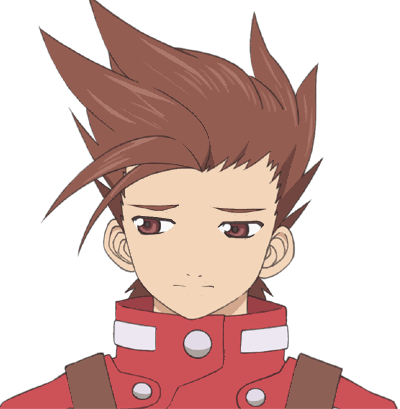
Speaking of inconsistent, Lloyd’s portrayed as a sympathetic everyday guy who tries hard even though others insult him while also having slight jerk tendencies and putting others down himself. I already mentioned how he tells Colette to change who she is for him, but let’s see what else he does.
So the three friends reach the temple and get defeated by Botta and his entourage of soldiers, but they’re bailed out when Kratos ![]() shows up and scares them into retreat. Colette and Genis are suitably impressed, but Lloyd has too much ego to admit anything.
shows up and scares them into retreat. Colette and Genis are suitably impressed, but Lloyd has too much ego to admit anything.
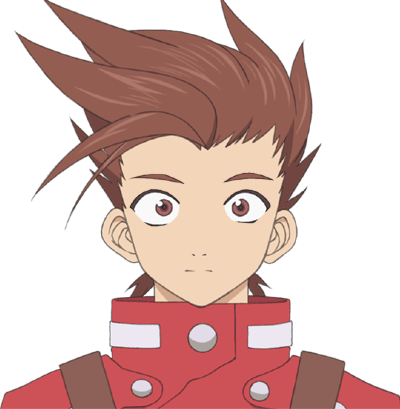
The temple is full of monsters as a trial for the Chosen and Lloyd volunteers to help, but her grandmother’s like nah, you won’t be enough, kiddo. Not in those words, but still. She’s shooting him down. Kratos takes the job and tells Lloyd he should just go home. So we’re supposed to be rooting for Lloyd to make something of himself, but he also has jealousy issues.

Colette intervenes and persuades Kratos to let him follow, saying she gets nervous when Lloyd’s not around. He thanks her for getting him in, which is the first nice thing he’s said, and she tells him:
It’s the truth!
…hey, remember one scene ago when she told him to stay behind? Can I trust anything this girl says?
Oh, wait, we’re talking about Lloyd now.
So they go in, then the angel Remiel bestows a red pendant on Colette, makes a Tower of Salvation appear, and tells her to head for the Seal of Fire. Simple, clear, and effective. She asks about the rumor of her real father being an angel, and he does call her his beloved daughter.
That’s a journey only for her, though. Back in town, Lloyd and Genis ask to get in on the questing, but they’re booted out—and we should feel bad for them, especially Lloyd. See, he’s untapped potential and no one will give him a chance. But then it turns out he’s forgotten Colette’s birthday and lies to her that he’s making a necklace when he actually hasn’t started. How did he forget her birthday? She’s one of his only two friends.
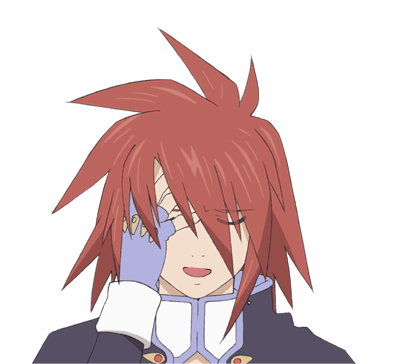
But then things look up for our hero. He and Genis stop by a human ranch—where Desians keep slave labor—and speak with old lady Marble, who needs a Key Crest. Only dwarves can make them, but Lloyd’s dad Dirk is a dwarf. Just then the Desians spot Marble and take her to be whipped. Genis creates a distraction, but trips and alerts them to where he is, so Lloyd kills off a couple to allow their escape. This is his first real heroic act.
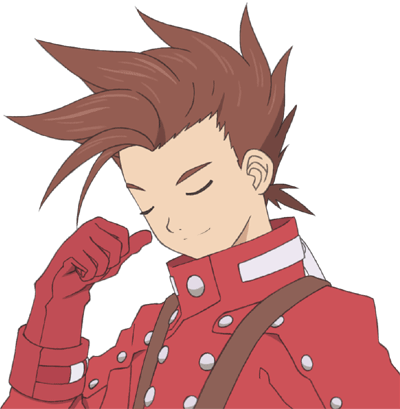
After getting home, Lloyd says he needs a Key Crest to give to a mercenary, but Dirk sees through a hole in his explanation.
Dirk: Dwarven Vow #11: Lying is the first step to the path of thievery!
Now we can set up the story ahead and establish our hero’s motivation. Lloyd admits he went to the ranch and Dirk asks if he kept his Exsphere safe—years ago the Desians killed his mother to try to get hold of it, so it must be important. He never let Lloyd know because he would have tried to take revenge, and tells him to leave everything to Colette.
So let’s survey what everyone says about Lloyd.
You’re a burden.
Colette’s grandmother Phaidra: I’d be uneasy with just you.
Lloyd’s father Dirk: Leave everything to Colette.
Even though he forgets birthdays and tries to change his friends, it’s pitiable how many times Lloyd gets smacked down.
—
—
—
3) Secret of Symphonia: Angels Dear; or, Symphonia Densetsu
Now that he knows who killed his mother, Lloyd can’t stand by anymore. Dirk almost decks him a good one, but he dodges and runs outside—where Colette’s waiting to tell him when she’s leaving. He apologizes to her for not finishing her present, but she’s cool with it and just asks him to wish her a happy birthday.
And I just ask you: low maintenance or low standards? 
Lloyd wants in on the journey more than ever now, though, so she relents and tells him when she’ll be leaving.
In the morning, Lloyd finishes his necklace and reconciles with Dirk, who supports him with a Key Crest and supplies after all. It’s time to set out, Lloyd and his pet wolf-dog-horse Noishe—but Genis arrives and, ah, Colette and the others already left. She lied about the time. She left a note for him, though, and here’s the gist of it: “The journey is too dangerous for you, so stay here and live a happy life after I save the world. Thanks for your friendship, and goodbye.”
[replay of earlier scene]
I get nervous when Lloyd’s not around.
Uh-huh. She only wanted to stop Kratos and Lloyd’s squabbling. And there’s another slap in the face for our hero. Not even Colette thinks he can handle it.
Before anyone can explain the air of finality in her letter, Desians start burning houses down because Lloyd violated a peace treaty. Their leader Forcystus sends a monster to kill him, but identifies Lloyd’s Exsphere when he defeats it in battle. But the monster is really a transformed Marble—and she self-destructs, wounding Forcystus into backing off for now. No rest for the weary, though. Because of all those in town who were killed, the mayor banishes our heroes, and Genis takes the Exsphere Marble left behind.

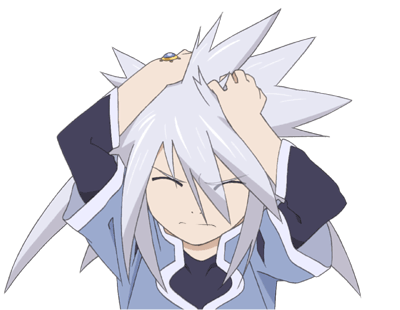
(Note: we never see mounds of bodies. Another way Symphonia is reminiscent of old-school RPGs is that it requires some imagination.)
With no clue where Colette might be, our heroes head for the desert and find a wanted poster of Lloyd. It’s an ugly caricature, but Genis thinks that’s great because they’ll never find him.
[clip: the Desians find him ten seconds later]
Hey, good call, Genis. There’s a reason the localization team pulled the “u” out of your name. After defeating them, Genis tells Lloyd not to let his guard down. Lloyd says he’s not…
[clip: the Desians zap him in the back one second later]
…but he is. Hey, good call, Genis! You know the best part, though? Five people warned Lloyd he’s not as great as he thinks, so he had it coming.
Actually, the real best part is this: awakening the elemental spirits, getting banished from your hometown, being captured mere minutes into your journey—it’s like 1993 all over again.
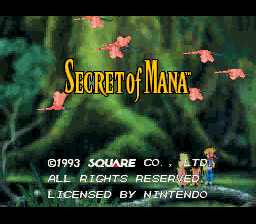
The soldiers take Lloyd away, but don’t know or care who Genis is, so they let him go to hatch a jailbreak plan. Our red-clad hero almost escapes himself, but the base leader Yuan proves too much for him—and Botta runs in too. …but so do Colette, Kratos, and Genis. Yuan leaves it all to his underling and the party scores a shocking victory!!! in four-on-one combat, sending Botta running and dropping another Exsphere for Raine.
Next day, the party heads for the Fire Seal and Kratos remarks that their group doesn’t look like one that would save the world. Wait until they start releasing Dragon Quest in your universe. In the first game you have a legendary warrior, then you have… an early 20th century pilot? In DQIII and IV you have slick lightly-armored heroes, then a gypsy prophet guy, then—Teenage Vegeta with blue hair? He’s gone Blueper Saiyan! I don’t know.
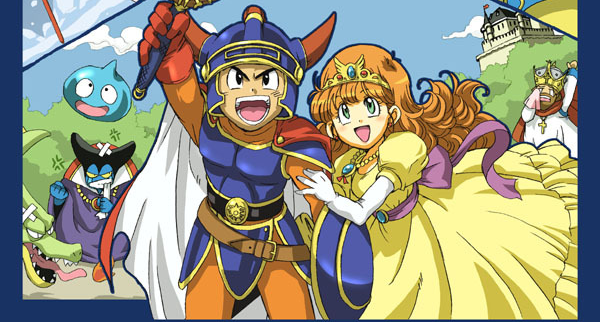
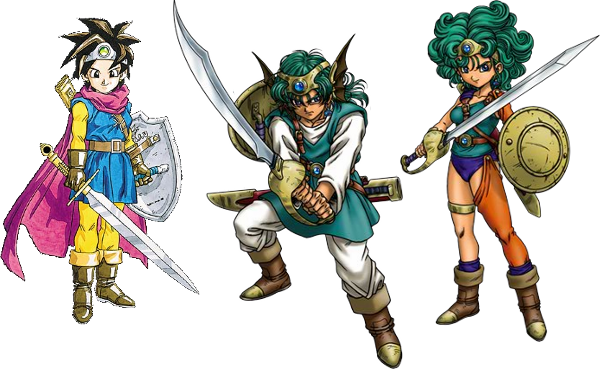
Dragon Quest II, V, and VI Heroes
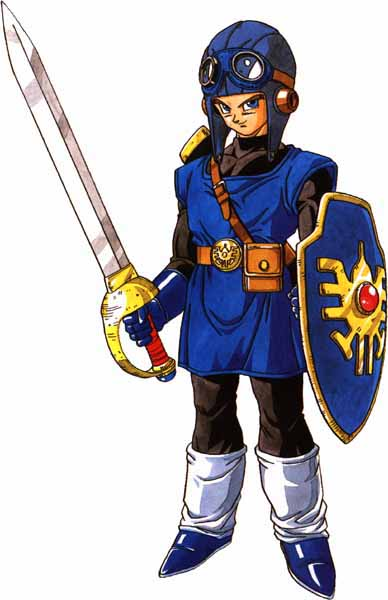
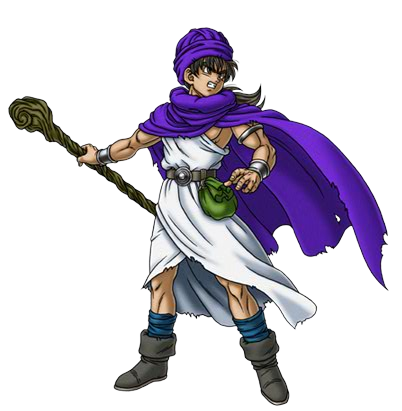
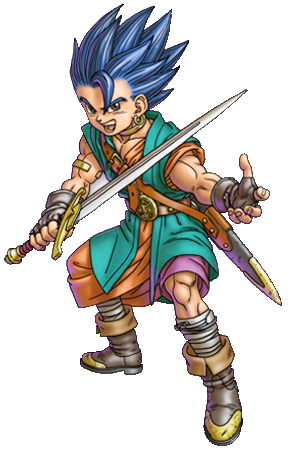
And then we have DQVII.
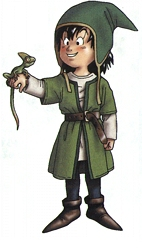
But I digress. The party plows through the Fire Seal and Remiel grants Colette pink energy wings and tells her she’ll have a painful transformation that night as she becomes an angel. Colette and Genis have fun seeing her flap her new wings–at least until Lloyd butts in again to tell them to stop being who they are and start being who he wants them to be. “Okay, that’s enough, you two, we get it.”
He’s not all jerk, though, right?
—
—
—
4) I’m Sorry, But I Don’t Get It
Part 1
Colette collapses like Remiel warned, then we get the start of what I would call a recurring gag if it was funny, but I don’t think it is and I don’t think it’s supposed to be—I’m not sure what it’s for.
I’m sorry to cause so much trouble…
Stop apologizing all the time, you dork!
*Sigh* You’re right… I’m sorry.
Um… what? This scene completely baffled me the first time I played and I couldn’t pinpoint why, but now I’ve figured it out. For one thing, Lloyd is trying to pick a verbal fight with Colette, or boss her around, or something, when she’s on the verge of passing out. Not the time for that, dude. Bring it up when she’s feeling alright. Here’s the bigger problem, though.
(brief caption flash: I wish I could take credit for figuring this next part out, but I can’t. I can’t remember who did, either—it was a random YouTube comment I saw once.)
(clip of every time “I’m sorry” has been said so far; Colette’s said it 5 times, but Genis goes up to 6 and Lloyd goes up to 9)
Stop apologizing all the time, you dork!
You first, my man, you first. And it doesn’t stop either. That night, Lloyd tries to give her his necklace, but it broke while they traveled.
…I’m sorry, I’ll make you a new one.
Thanks… and… I’m sorry that I keep causing trouble for you.
Lloyd asks if she’s eaten, but the others tell him he shouldn’t push her.
I’m sorry, Colette.
Hey Lloyd. Stop apologizing all the time, you dork.
—
—
—
5) An Ankle Caught By Heaven’s Snare
While heading east, a ![]() ninja girl ambushes the party, aiming for Colette’s life! …but she’s messing with a living deus ex machina who takes one step back and triggers a lever that opens a mine shaft for her to fall into. She still catches up later with her guardian monster thing, but the party scores a shocking victory!!! in four-on-two combat and she smoke bombs out of there.
ninja girl ambushes the party, aiming for Colette’s life! …but she’s messing with a living deus ex machina who takes one step back and triggers a lever that opens a mine shaft for her to fall into. She still catches up later with her guardian monster thing, but the party scores a shocking victory!!! in four-on-two combat and she smoke bombs out of there.

And only then does Kratos mention how the party can combine their moves. It might have been nice to teach them teamwork before they were attacked by ninjas. Just saying! I mean, he taught them how to use magic shields before entering the Fire Seal. Anyway, Colette wants to ask the girl why she tried to kill her and tells Lloyd to come up with a plan to befriend her.
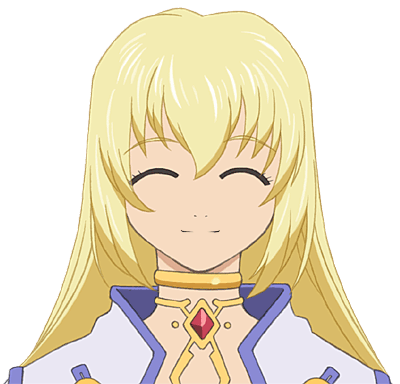

On my first playthrough, I thought something like this in the back of my mind: that girl is on the cover, so she probably will be a party member. I wonder if this is a situation where everyone thinks Colette’s a flippant, clueless goofball who gets by on pure luck (see also: The Irresponsible Captain Tylor, The Fool archetype), but really she knows exactly what’s going on—and she’ll prove that, but in a way that only the audience will realize it. We’ll look at that a few more times later.
For now, we get this blurb shortly after: Genis asks if she’ll get a halo or start glowing next, so she looks hurt and Raine drags him away for… being inappropriate? Then Colette asks Lloyd if it’s weird to have wings.
Wait a minute. I don’t understand. I guess by definition she’s weird, but she’d lean toward admired weird, not scorned weird.
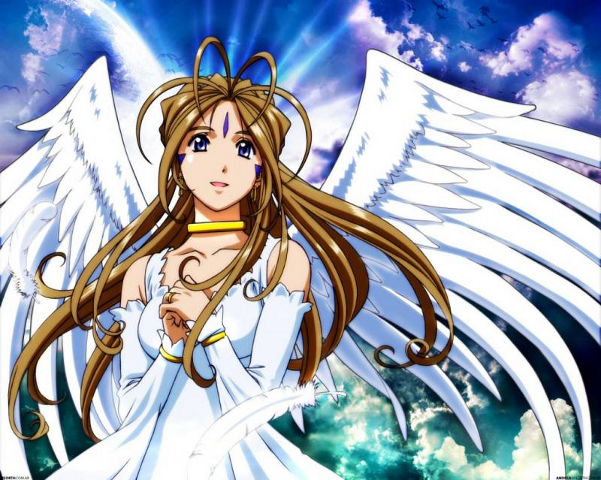
And if you poll people on superpowers they wish they had, flying will be in the top five every time. Now Colette can fly when she wants to, and when she doesn’t want to, she can retract her wings. Nobody has to know she’s any different—and if she really doesn’t like her wings, why does she have them out in every battle? She can fight without them. Either way, she has all of the upside and none of the downside, but she’s not happy. I don’t get it.
…unless this is another early hint, but I’ll save what it’s hinting about for later.
—
—
—
6) To and Fro, a Great Big No, Defeating Foes, the Heroes Show
[Note: Your story events might play out in slightly different order since we’ve hit the first of a few non-linear turns in the game. I’m taking a common, straightforward route, though.]
The party wrangles a boat to another continent and bumps into a new group of travelers, breaking their potion. They offer to buy a replacement, but first meet with the Governor to collect the Book of Regeneration, a record of a previous Chosen’s journey—but he already gave it away to an impostor.
Do you use your eyes at all or are they just there for decoration?
So much for that. Colette’s actually happy with being impersonated, though. It makes her feel like a celebrity, and more Chosens equal higher odds to save the world. Well—can’t argue with that. The party meets a girl named Chocolat and gives a new potion to the other group, who mumbles about pawning off a book before they leave. Lloyd figures out who they are too late and the others gripe at him for being stupid, which is true–but hey, they know he’s dumb and they didn’t jump in to stop the impostors either.
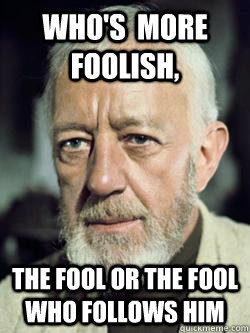
Half a continent away, the party finds the Book of Regeneration’s new owner and asks to read it for clues, but he gives them a big no unless they bring him a rare item. They find out that the Desians are going to attack Palmacosta—so they travel all the way back and find Chocolat’s mother set up for a hanging. The Desian Lord Magnius snaps a guy’s neck, but a boy who doesn’t understand broken necks throws a rock at him. He’s about to get his suicide wish fulfilled, but Lloyd interrupts with a Demon Fang attack. Raine tells him to not get another town burned, but our hero counters with his best line so far.
How can we go on a quest to regenerate the world if we can’t even save the people standing right in front of us?!
You win that one, Lloyd. Genis blocks the enemy mages; Colette frees Chocolat’s mother from a distance, distracting Magnius; Kratos slashes him in the stomach. Raine’s not having any of this hero stuff—but Lloyd says he’ll destroy their entire ranch. She calls insanity on that, but I say maybe not. Magnius is retreating and he only took two hits. Our heroes have won their first huge victory.
[battle victory quote]
Good job, everyone!
Afterward, Chocolat thanks Colette for saving them, but says she doesn’t believe in a Goddess who sleeps while everyone suffers. Here we see yet another aspect of Colette and how her lifelong studies at the Church of Martel have paid off. Forget apologies—it’s time for apologetics. She dusts off her knowledge of Leibniz and quotes key passages of the Theodicy, then gives her takes on Aquinas’ Summa Theologica.
Genis attempts to contribute by bringing up Anselm’s ontological argument, but Colette’s fair-handed and says that that might only be a quirk of the puzzle of non-referring names and/or Plato’s theory of forms. From there, however, she delves into the metaphysics of and the difference between a contingently-existent entity and a necessarily-existent entity and whether–
–oh, wait. No. No. She only says she understands not believing, but she does believe.
I was hoping for a philosophy debate lasting days. Both sides would whip out some a priori arguments and discuss their correspondence with reality. Now, they’d probably ignore the implications of the Münchhausen Trilemma: that all logical proofs rely on either circular argument, an infinite regress, or tautologies, all of which means that Socrates figured out what was up way back when: we don’t know anything about anything.

You see, the phrase “God knows” exists for a reason, which is that there are ultimate limitations to knowledge. Even if you want to probe the boundaries in a Cartesian way, you’ll find that logic is a closed system that can justify everything except its own foundations, so the best you can do with ethics is construct a framework around consistency like Immanuel Kant. The problem is that consistency can’t inform us about the nature of what is real. What about empiricism, then? No, says David Hume, even empiricism—arguably especially empiricism—is a circular argument. In practice it works and yet in logic it doesn’t, so is our philosophy flawed or is our reality flawed?
Similarly, when Chocolat brings up the problem of evil, she’s begging the question—no more than any other argument, of course, but that’s the futility of philosophy, even though I love it: that it’s always begging the question. We can’t prove that evil exists (unlike our ability to prove that inconsistency exists), and even if we assume it does, then we can’t prove an actual—not a perceived, but an actual—incompatibility with a benevolent Goddess.
Now, by saying “actual incompatibility” I’m invoking the concept of an objective reality—or, in this case, perhaps an objective meta-reality. If you believe there is no objective reality, then everything I say makes full sense, partial sense, no sense, and anti-sense all at once, so it hardly matters what I argue.
If you do believe in an objective reality, then the question is how to determine what it is. The physical world is there on one side, and the world of thought on the other, and we can see them both in their own realms and we deal with each of them every day, but whenever we try to build a bridge between them, half of that bridge falls to pieces. What are we to do? Give up? Believe in everything? Believe in nothing? Is everything one great Schrödinger’s cat, both alive and dead?

Pingback: Tales of Symphonia Text Review and Story Breakdown: Part 2 | Project Dreamblazers
Pingback: Tales of Symphonia Text Review and Story Breakdown: Part 3 | Project Dreamblazers
Pingback: Tales of Symphonia Text Review and Story Breakdown: Introduction | Project Dreamblazers
Pingback: Tales of Symphonia Text Review and Story Breakdown: Part 4 | Project Dreamblazers
Pingback: Tales of Symphonia Text Review and Story Breakdown: Part 5 | Project Dreamblazers